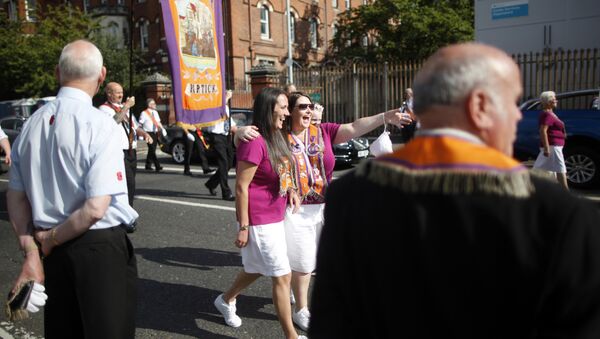On Thursday, July 12, tens of thousands of members of Northern Ireland's Protestant Orange Order, will be marching to traditional flute bands and lambeg drums to mark the victory of Protestant King William of Orange — nicknamed King Billy — over Catholic King James at the Battle of the Boyne in 1690.
The Williamite War in Ireland led to a Protestant monarch reigning over the British Isles and many Irish Catholics believe it was the beginning of almost three centuries of subjugation.
Vehicles were set on fire, petrol bombs thrown and roads were closed off in violence in several towns on the night of Wednesday, July 11, which is traditionally known as Eleventh Night and is marked by the lighting of huge bonfires across Protestant areas of Northern Ireland.
More from the #hatefest and the #eleventhnight #bonfires18 what a bunch of knuckledragging bigots. pic.twitter.com/rW6KWRldhx
— Irish Democrat 🇮🇪 (@IrishDemocrat1) 11 July 2018
Troubles Ended Twenty Years Ago
Although the Good Friday Agreement in 1998 ended The Troubles — in which more than 3,000 people lost their lives — loyalist paramilitary groups like the Ulster Volunteer Force (UVF) still hold sway over many loyalist communities and the UVF was blamed for trouble in East Belfast on Wednesday.
Is it really necessary to include Palestinian, European Union & Republic of Ireland flags on top of bonfires? #12thJuly #Rathcoole
— Harry (@harrybrobinson) 11 July 2018
Kate Evans, who lives in Portadown, said the Battle of the Boyne was a "very important part of Protestant history" and she taught her eight-year-old daughter what lay behind the celebrations.
July, the one month of the year that I am ashamed to identify as Northern Irish #EleventhNight #Twelfth
— Paul McKenna (@paullarry) 11 July 2018
"I feel the Troubles in Northern Ireland have caused us to forget the origins of these traditions and many now see it as an opportunity to show their hate towards Sinn Fein/IRA. A lot of loyalists see the flag of Ireland as a symbol of the IRA and burning the flag is a way to show the hurt and anger caused by the Troubles. If the flag hadn't been hijacked by the IRA and Sinn Fein then I strongly believe it wouldn't be burned on the bonfires. This is an image politics and society need to work hard to change. The Irish flag is a national symbol for so many people of Ireland that wouldn't dream of association to the IRA and Sinn Fein and I think people need to remember that and be respectful of it," Ms. Evans told Sputnik.
This made me smile today. The future 😎 pic.twitter.com/fpcRvA0b0t
— David Gorman 🤔🤘 (@davyg1978) 12 July 2018
"The 11th night here is celebrated with bonfires — areas which host the 12th celebrations will have family fun days and fireworks on the 11th — as beacons were little before the Battle of the Boyne to show (William's) boats where to go when docking at Carrickfergus," Ms. Evans told Sputnik.
12th July 1690 — William of Orange defeated the deposed Catholic, King James II, at the Battle of the Boyne in Ireland. pic.twitter.com/gtGRLfQyb5
— History (@HistoryTime_) 12 July 2018
'Completely Disrespectful'
"I personally don't go to 11th night celebrations as I feel the burning of the flag of Ireland and election posters is completely disrespectful — and to me absolutely nothing to do with the battle of the Boyne," she told Sputnik.
Looks like the UVF have hijacked a bus and burnt it out.
— Craic-xit #FBPE 🇬🇧 🇪🇺 (@Craicxit) 11 July 2018
Belfast on bonfire night, ladies and gentlemen.#eleventhnight #Twelfth pic.twitter.com/BNgfAk0fSr
Kylie Noble, a 24-year-old freelance journalist who grew up in County Fermanagh, said she remembered the 12th of July fondly from growing up but felt differently about it, especially since moving to London last year.
"Unionism and loyalism are pretty different. I grew up in a unionist community in County Fermanagh…there are no bonfires in Fermanagh, so they feel very alien to my experience of the 12th, which was rural, less violent and much more church-influenced. The 12th growing up was simply another holiday like Easter or Christmas, which I never really questioned what it meant. I knew it was for Protestants but didn't know the history. It was a family day out, then a teenage drinking event," Miss Noble told Sputnik.
She said the 12th of July was an important date in the Protestant calendar in Northern Ireland.
Eleventh Night bonfires lit across Belfast pic.twitter.com/9Mv0lu1bTo
— UTV (@utv) 11 July 2018
"I don't see it going anywhere soon. I would hope it could become less violent and intimidating overall but due to what it celebrates I question if that is ever possible," Miss Noble told Sputnik.
Poilce said a blast bomb was thrown from a Protestant district into the neighboring Catholic enclave of the Short Strand in east Belfast on Wednesday.
Although July 12 marks the anniversary of the Battle of the Boyne, historians point out the date was originally linked to the Battle of Aughrim, in July 1691, which was a later and more decisive victory for King William.
So much positivity and community spirit around the bonfires tonight, despite the doom and gloom merchants and the perma offended trying to tarnish the occasion for everyone.
— #GAWA 🍺🇬🇧 (@Uunionist) 11 July 2018
Enjoy the rest of your night and have a great day tomorrow 🇬🇧🍺🇬🇧 #Orangefest #12thJuly #Twelfth


